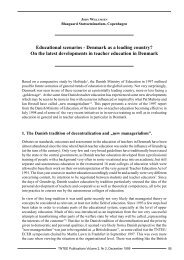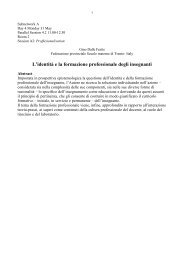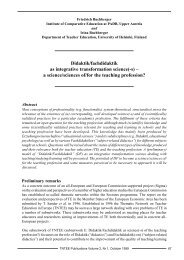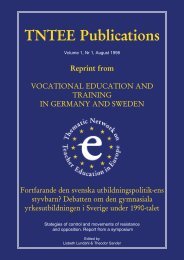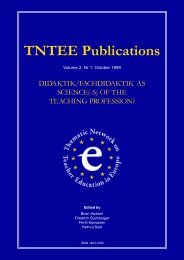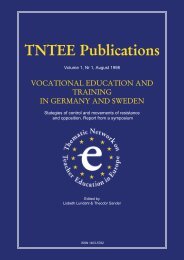Didaktik as the professional science of teachers - tntee
Didaktik as the professional science of teachers - tntee
Didaktik as the professional science of teachers - tntee
You also want an ePaper? Increase the reach of your titles
YUMPU automatically turns print PDFs into web optimized ePapers that Google loves.
88<br />
<strong>Didaktik</strong> <strong>as</strong> <strong>the</strong> <strong>pr<strong>of</strong>essional</strong> <strong>science</strong> <strong>of</strong> <strong>teachers</strong><br />
Despite all student orientation one h<strong>as</strong> to notice, however, that a school <strong>as</strong> a learning formation,<br />
established and maintained by society, h<strong>as</strong> to accomplish its reproduction function with regard to<br />
culture, economy and politics (Fend 1981). The <strong>pr<strong>of</strong>essional</strong> teacher h<strong>as</strong> to balance <strong>the</strong> experiences<br />
and demands <strong>of</strong> two proponents: students and society.<br />
<strong>Didaktik</strong> <strong>as</strong> <strong>the</strong> <strong>pr<strong>of</strong>essional</strong> <strong>science</strong> <strong>of</strong> <strong>teachers</strong> must not be limited to a <strong>the</strong>ory <strong>of</strong> teaching. It also<br />
h<strong>as</strong> to include a <strong>the</strong>ory <strong>of</strong> Bildung and a <strong>the</strong>ory <strong>of</strong> school.<br />
The ‘Map <strong>of</strong> <strong>the</strong> Pr<strong>of</strong>essional Science <strong>of</strong> Teachers’ shown on <strong>the</strong> next page outlines <strong>the</strong>se connections.<br />
Figure 1<br />
Theory <strong>of</strong><br />
Bildung<br />
Bildung <strong>as</strong> a<br />
social norm<br />
General knowledge<br />
<strong>as</strong> <strong>the</strong><br />
teaching<br />
target<br />
Contents<br />
Syllabus/Curriculum:<br />
teaching targets -<br />
teaching contents<br />
Organization <strong>of</strong><br />
teaching contents:<br />
fields <strong>of</strong> life-subject<br />
matters-key problemsprojects<br />
Realization <strong>of</strong> <strong>the</strong><br />
“didactical analysis”<br />
(identify teaching<br />
contents <strong>as</strong> educational<br />
contents)<br />
Map <strong>of</strong> <strong>the</strong> Pr<strong>of</strong>essional Science <strong>of</strong> Teachers<br />
<strong>Didaktik</strong><br />
Theory <strong>of</strong><br />
Teaching<br />
Time<br />
School days and<br />
ages <strong>of</strong> students<br />
Distribution <strong>of</strong><br />
<strong>the</strong> daily time<br />
for teaching<br />
Duration <strong>of</strong><br />
teaching units<br />
single lessonscumulated<br />
lessons<br />
teaching in epochs<br />
Planning <strong>of</strong><br />
Lessons<br />
TNTEE Publications Volume 2, Nr 1, October 1999<br />
Theory <strong>of</strong><br />
School<br />
Organization <strong>of</strong><br />
<strong>the</strong> school<br />
system<br />
(differentiation<br />
and integration)<br />
School <strong>as</strong> an<br />
organizational<br />
framework <strong>of</strong><br />
teaching<br />
School climate<br />
<strong>as</strong> a condition<br />
or teaching<br />
quality<br />
School<br />
automomy and<br />
school quality<br />
<strong>as</strong> trends<br />
Procedures<br />
The teaching<br />
unit and its<br />
structure<br />
Forms <strong>of</strong><br />
social interaction<br />
and<br />
activities <strong>of</strong><br />
alesson<br />
Creation <strong>of</strong> a<br />
methodological<br />
concept<br />
(macro- and<br />
micro-structure<br />
<strong>of</strong> an efficient<br />
lesson procedure)



